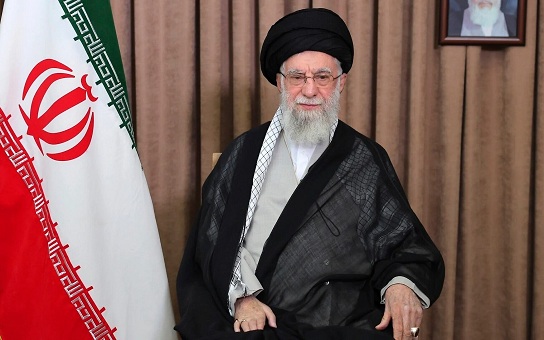Iran’s supreme leader rejected US calls for surrender and warned that joining the war would lead to “irreparable damage”, as Israel ramped up rhetoric about regime change and ordered civilians to evacuate a district in Tehran.
Ayatollah Ali Khamenei also said Israel made a “huge mistake” by launching the war, in his first comments since Friday.
“Intelligent people who know Iran, the Iranian nation, and its history will never speak to this nation in threatening language because the Iranian nation will not surrender,” he said in a statement read out by a presenter on state TV.
“The Americans should know that any US military intervention will undoubtedly be accompanied by irreparable damage.”
Tehran was preparing missiles and other equipment to strike US bases in the region if Washington joined the war, the New York Times reported, citing US intelligence officials.
On Tuesday the US president, Donald Trump, warned his “patience was growing thin” and demanded Iran’s capitulation in a two-word post on his Truth Social platform: “UNCONDITIONAL SURRENDER!”
The Trump administration initially distanced itself from the war, saying Israel had acted alone, but in recent days it has stepped up both its rhetoric and its military presence in the region.
Iran’s Fordow nuclear facility is at the heart of demands for the US to join the war, both in Israel and from hawks in Washington. Damage from extensive strikes on other facilities could be repaired within months, both Israeli military officials and nuclear experts say.
Destroying or crippling Fordow would have much more of a long-term impact on Iran’s ability to move towards creating a nuclear bomb.
It is buried deep below a mountain near the holy city of Qom, and the only munitions that could potentially damage or destroy it are the most powerful US bunker buster bombs, which only US B-2 bomber planes can carry.
Israel’s national security adviser, Tzachi Hanegbi, said the war had been an entirely Israeli campaign, but it “will not end without damaging Fordow”, in an interview with Israel’s Channel 12 television.
If the US does not join, Israel might still have military options but they would be riskier and more complicated. It could attempt to fly in special operations troops for a ground operation, like one that targeted a missile factory in Syria last year, or disable Fordow by attacking critical support systems such as its power supply.
Israel says it launched the war in self-defence, to destroy Iran’s nuclear programme, but Netanyahu and several ministers have made no secret of their desire for regime change.
Trump reportedly vetoed an Israeli plan to assassinate Khamenei, and critics have questioned why Israel targeted civilian institutions such as the state broadcaster.
On Wednesday, the defence minister, Israel Katz, said Israel was bombing “symbols of power” in Iran and suggested the regime could be in its last days.
“A tornado is sweeping through Tehran,” he wrote in a post on X. “Symbols of power are being bombed and collapsing, from the broadcasting authority and soon other targets, and masses of residents are fleeing. This is how dictatorships collapse.”
The escalating conflict has prompted a growing international chorus of concern. The Russian president, Vladimir Putin, offered to mediate between Iran and Israel, after one of his top diplomats urged Washington not to consider “speculative options” for intervention.
“This would be a step that would radically destabilise the entire situation,” deputy foreign minister Sergei Ryabkov said, according to the Interfax news agency.
The Chinese president, Xi Jinping, also said on Wednesday he was “deeply worried as Israel’s military operation against Iran has caused a sudden escalation of tensions in the Middle East”.
The Turkish president, Recep Tayyip Erdoğan, had earlier said Iran had a legitimate right to defend itself in the face of Israel’s “thuggery and state terrorism”. He attacked Israel for launching a war while negotiations were still under way.
On a sixth night of attacks, Israel bombed a site that manufactured uranium centrifuges and also said it targeted a missile component factory and destroyed five attack helicopters.
Iran’s military has been battered but not fully destroyed. An advanced Israeli drone was shot down on Wednesday, despite Israel claiming control of the skies over western Iran and Tehran. Overnight Iran fired 15 missiles at Israel.
The International Atomic Energy Agency (IAEA) confirmed Israeli strikes had hit two centrifuge productions in Iran, one in the capital and another in a city just outside it.
“At the Tehran site, one building was hit where advanced centrifuge rotors were manufactured and tested,” the IAEA said in a social media post. “At Karaj, two buildings were destroyed where different centrifuge components were manufactured.”
Iran has reported at least 224 deaths from Israeli attacks, mostly civilians, although it has not updated that toll for several days. A US-based watchdog, Human Rights Activists in Iran, says at least 585 people have been killed and more than 1,300 injured.
Iranian attacks on Israel have killed 24 people, all civilians. Israeli air defences have intercepted the majority of the 400 missiles fired by Tehran, with only about 10% hitting targets inside the country.
Israel could become more vulnerable if the war continues much longer as supplies of its most effective air-defence missiles are running low, the Wall Street Journal reported, citing a US official.
Its Arrow interceptors are complex missiles that cost several million dollars each, and have a long production process.
Although the US has been supporting Israel’s defences with Thaad ground-based systems, interceptions by F-16 jets and missiles launched by the navy, it does not have unlimited supplies of these defensive systems either.
Iran is still thought to have a substantial proportion of the estimated 2,000 missiles that were in its arsenal at the start of the war. Israeli strikes have focused on launcher systems that are needed to fire them.
-Theguardian-





